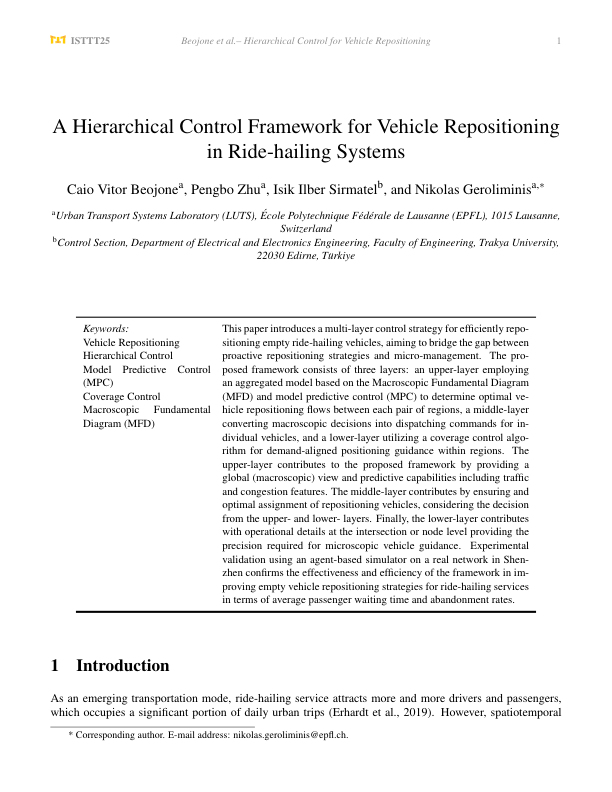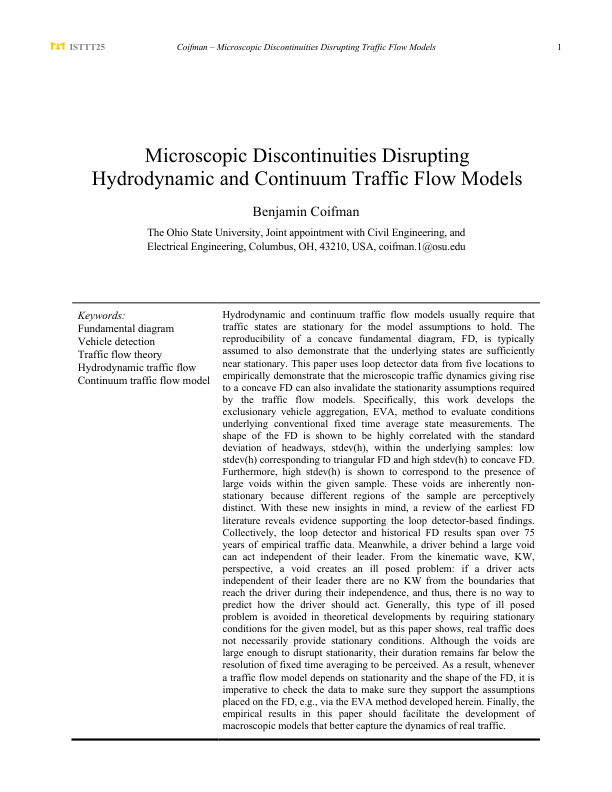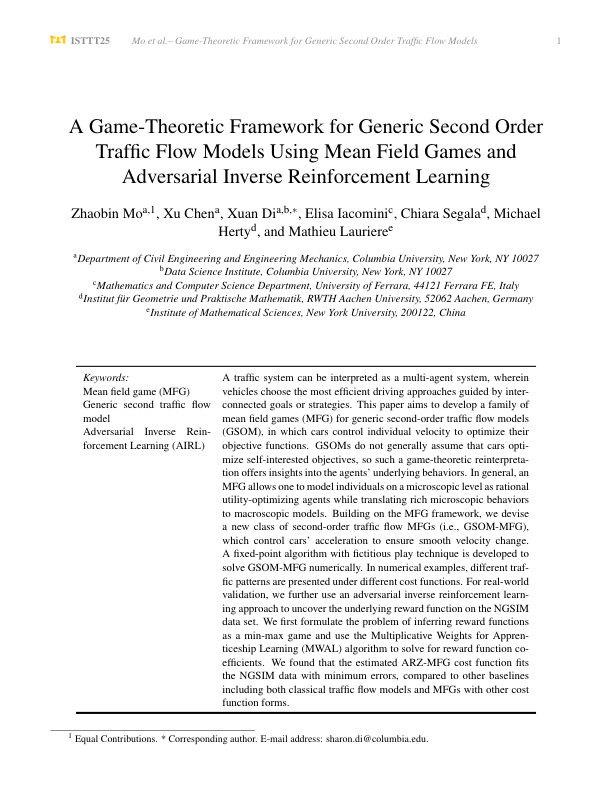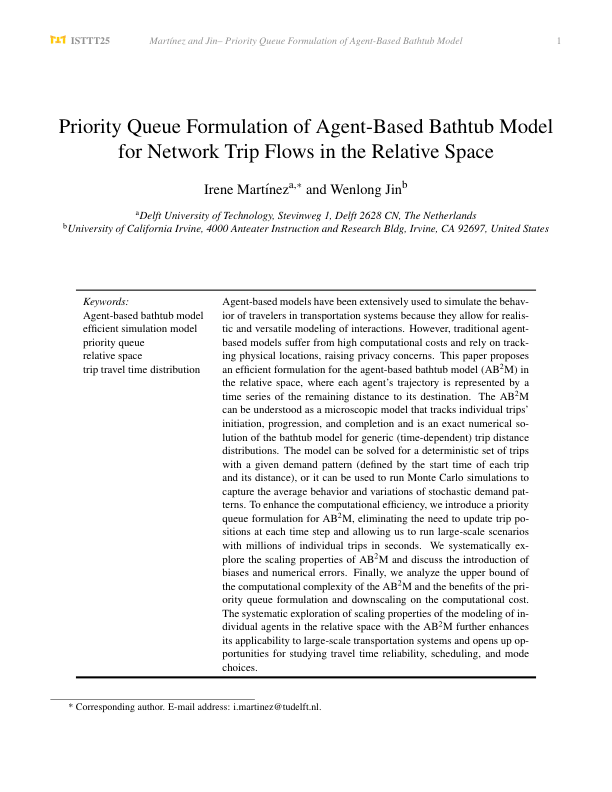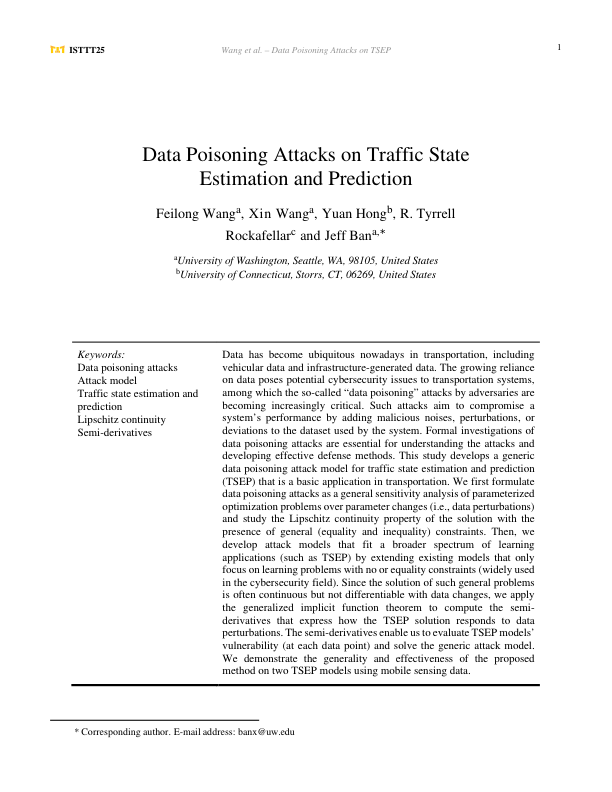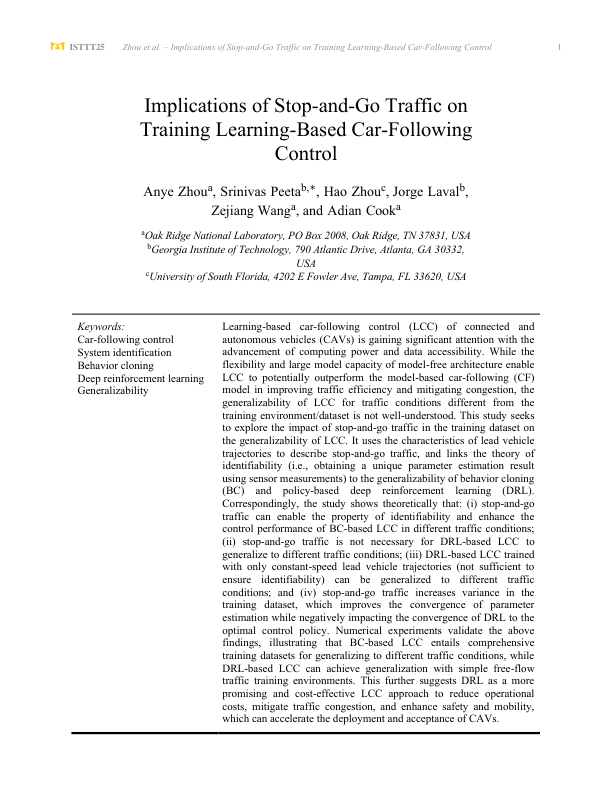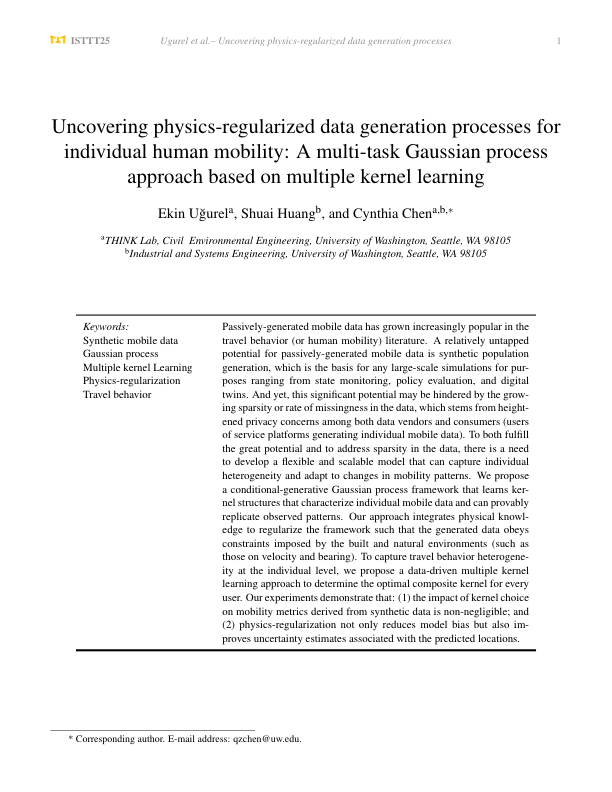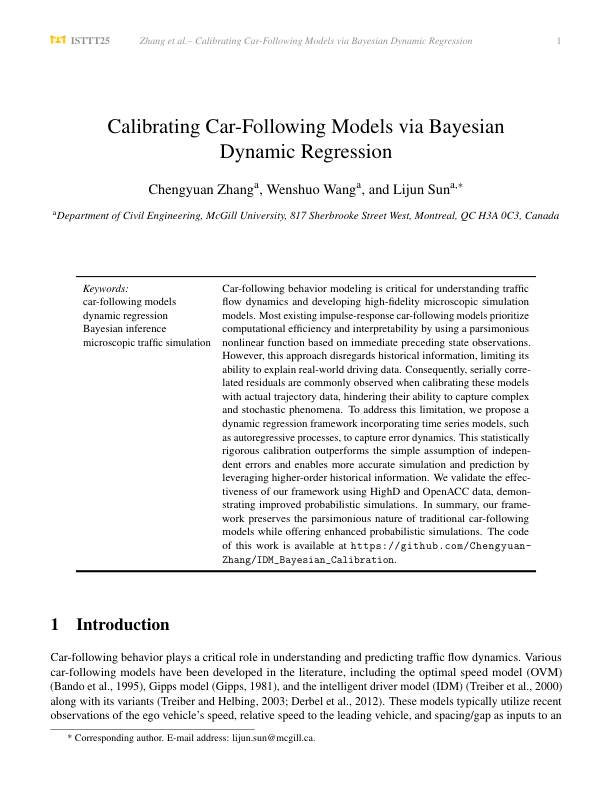Podium Session 8: Design an Intermediary Mobility-As-A-Service (MaaS) Platform Using Many-To-Many Stable Matching Framework
Title: Design an Intermediary Mobility-As-A-Service (MaaS) Platform Using Many-To-Many Stable Matching Framework
Authors: Rui Yao, Kenan Zhang
Abstract: Mobility-as-a-service (MaaS) provides seamless door-to-door trips by integrating different transport modes. Although many MaaS platforms have emerged in recent years, most of them remain at a limited integration level. This study investigates the assignment and pricing problem for a MaaS platform as an intermediary in a multi-modal transportation n...
Keywords: mobility-as-a-service (MaaS); many-to-many stable matching; network design; multi-modal traffic assignment
Podium Session 8: A Hierarchical Control Framework for Vehicle Repositioning in Ride-Hailing Systems
Title: A Hierarchical Control Framework for Vehicle Repositioning in Ride-Hailing Systems
Authors: Caio Vitor Beojone, Pengbo Zhu, Isik Ilber Sirmatelb, Nikolas Geroliminis
Abstract: This paper introduces a multi-layer control strategy for efficiently repositioning empty ride-hailing vehicles, aiming to bridge the gap between proactive repositioning strategies and micro-management. The proposed framework consists of three layers: an upper-layer employing an aggregated model based on the Macroscopic Fundamental Diagram (MFD) and...
Keywords: Vehicle Repositioning; Hierarchical Control; Model Predictive Control (MPC); Coverage Control; Macroscopic Fundamental Diagram (MFD)
Podium Session 8: On-Demand Meal Delivery: A Markov Model for Circulating Couriers
Title: On-Demand Meal Delivery: A Markov Model for Circulating Couriers
Authors: Michael G H Bell, Dat Tien Le, Jyotirmoyee Bhattacharjya, Glenn Geers
Abstract: On-demand meal delivery has become a feature of most cities around the world as a result of platforms and apps that facilitate it, as well as the pandemic, which for a period closed restaurants. Meals are delivered by couriers, typically on bikes, e-bikes or scooters, who circulate collecting meals from kitchens and delivering them to customers, wh...
Keywords: Ghost kitchens; On-demand delivery; Markov chains
Podium Session 9: Microscopic Discontinuities Disrupting Hydrodynamic and Continuum Traffic Flow Models
Title: Microscopic Discontinuities Disrupting Hydrodynamic and Continuum Traffic Flow Models
Authors: Benjamin Coifman
Abstract: Hydrodynamic and continuum traffic flow models usually require that traffic states are stationary for the model assumptions to hold. The reproducibility of a concave fundamental diagram, FD, is typically assumed to also demonstrate that the underlying states are sufficiently near stationary. This paper uses loop detector data from five locations to...
Keywords: Fundamental diagram; Vehicle detection; Traffic flow theory; Hydrodynamic traffic flow; Continuum traffic flow model
Podium Session 9: A Game-Theoretic Framework for Generic Second Order Traffic Flow Using Mean Field Games and Adversarial Inverse Reinforcement Learning
Title: A Game-Theoretic Framework for Generic Second Order Traffic Flow Using Mean Field Games and Adversarial Inverse Reinforcement Learning
Authors: Zhaobin Mo, Xu Chen, Xuan Di, Elisa Iacomini, Chiara Segala, Michael Herty, Mathieu Lauriere
Abstract: A traffic system can be interpreted as a multi-agent system, wherein vehicles choose the most efficient driving approaches guided by inter-connected goals or strategies. This paper aims to develop a family of mean field games (MFG) for generic second-order traffic flow models (GSOM), in which cars control individual velocity to optimize their objec...
Keywords: Mean field game (MFG); Generic second traffic flow model; Adversarial Inverse Reinforcement Learning (AIRL)
Podium Session 9: Priority Queue Formulation of Agent-Based Bathtub Model for Network Trip Flows in the Relative Space
Title: Priority Queue Formulation of Agent-Based Bathtub Model for Network Trip Flows in the Relative Space
Authors: Irene Martínez, Wenlong Jin
Abstract: Agent-based models have been extensively used to simulate the behavior of travelers in transportation systems because they allow for realistic and versatile modeling of interactions. However, traditional agent-based models suffer from high computational costs and rely on tracking physical locations, raising privacy concerns. This paper proposes an ...
Keywords: Agent-based bathtub model; efficient simulation model; priority queue relative space; trip travel time distribution
Podium Session 9: Data Poisoning Attacks on Traffic State Estimation and Prediction
Title: Data Poisoning Attacks on Traffic State Estimation and Prediction
Authors: Feilong Wang, Xin Wang, Yuan Hong, R. Tyrrell Rockafellarc, Jeff Ban
Abstract: Data has become ubiquitous nowadays in transportation, including vehicular data and infrastructure-generated data. The growing reliance on data poses potential cybersecurity issues to transportation systems, among which the so-called “data poisoning” attacks by adversaries are becoming increasingly critical. Such attacks aim to compromise a system’...
Keywords: Data poisoning attacks; Attack model; Traffic state estimation and prediction; Lipschitz continuity; Semi-derivatives
Podium Session 10: Privacy-Preserving Data Fusion for Traffic State Estimation: A Vertical Federated Learning Approach
Title: Privacy-Preserving Data Fusion for Traffic State Estimation: A Vertical Federated Learning Approach
Authors: Qiqing Wang, Kaidi Yang
Abstract: This paper proposes a privacy-preserving data fusion method for traffic state estimation (TSE). Unlike existing works that assume all data sources to be accessible by a single trusted party, we explicitly address data privacy concerns that arise in the collaboration and data sharing between multiple data owners, such as municipal authorities (MAs) ...
Keywords: Data Fusion; Federated Learning; Data Privacy; Traffic State Estimation; Traffic Flow Theory
Podium Session 10: Implications of Stop-and-Go Traffic on Training Learning-Based Car-Following Control
Title: Implications of Stop-and-Go Traffic on Training Learning-Based Car-Following Control
Authors: Anye Zhou, Srinivas Peeta, Hao Zhou, Jorge Laval, Zejiang Wang, Adian Cook
Abstract: Learning-based car-following control (LCC) of connected and autonomous vehicles (CAVs) is gaining significant attention with the advancement of computing power and data accessibility. While the flexibility and large model capacity of model-free architecture enable LCC to potentially outperform the model-based car-following (CF) model in improving t...
Keywords: Car-following control; System identification; Behavior cloning; Deep reinforcement learning; Generalizability
Podium Session 10: Uncovering Physics-Regularized Data Generation Processes for Individual Human Mobility: A Multi-Task Gaussian Process Approach Based on Multiple Kernel Learning
Title: Uncovering Physics-Regularized Data Generation Processes for Individual Human Mobility: A Multi-Task Gaussian Process Approach Based on Multiple Kernel Learning
Authors: Ekin Uğurel, Shuai Huang, Cynthia Chen
Abstract: Passively-generated mobile data has grown increasingly popular in the travel behavior (or human mobility) literature. A relatively untapped potential for passively-generated mobile data is synthetic population generation, which is the basis for any large-scale simulations for purposes ranging from state monitoring, policy evaluation, and digital tw...
Keywords: Synthetic mobile data; Gaussian process; Multiple kernel Learning; Physics-regularization; Travel behavior
Podium Session 10: Calibrating Car-Following Models via Bayesian Dynamic Regression
Title: Calibrating Car-Following Models via Bayesian Dynamic Regression
Authors: Chengyuan Zhang, Wenshuo Wang, Lijun Sun
Abstract: Car-following behavior modeling is critical for understanding traffic flow dynamics and developing high-fidelity microscopic simulation models. Most existing impulse-response car-following models prioritize computational efficiency and interpretability by using a parsimonious nonlinear function based on immediate preceding state observations. Howev...
Keywords: car-following models; dynamic regression; Bayesian inference; microscopic traffic simulation
Edited by Guoyang Qin

